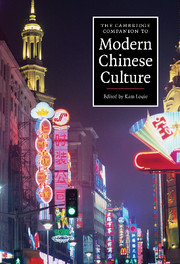Book contents
- Frontmatter
- 1 Defining modern Chinese culture
- 2 Social and political developments: the making of the twentieth-century Chinese state
- 3 Historical consciousness and national identity
- 4 Gender in modern Chinese culture
- 5 Ethnicity and Chinese identity: ethnographic insight and political positioning
- 6 Flag, flame and embers: diaspora cultures
- 7 Modernizing Confucianism and ‘new Confucianism’
- 8 Socialism in China: a historical overview
- 9 Chinese religious traditions from 1900-2005: an overview
- 10 Languages in a modernizing China
- 11 The revolutionary tradition in modern Chinese literature
- 12 The involutionary tradition in modern Chinese literature
- 13 Music and performing arts: tradition, reform and political and social relevance
- 14 Revolutions in vision: Chinese art and the experience of modernity
- 15 Cinema: from foreign import to global brand
- 16 Media boom and cyber culture: television and the Internet in China
- 17 Physical culture, sports and the Olympics
- Appendix
- Index
3 - Historical consciousness and national identity
Published online by Cambridge University Press: 28 May 2009
- Frontmatter
- 1 Defining modern Chinese culture
- 2 Social and political developments: the making of the twentieth-century Chinese state
- 3 Historical consciousness and national identity
- 4 Gender in modern Chinese culture
- 5 Ethnicity and Chinese identity: ethnographic insight and political positioning
- 6 Flag, flame and embers: diaspora cultures
- 7 Modernizing Confucianism and ‘new Confucianism’
- 8 Socialism in China: a historical overview
- 9 Chinese religious traditions from 1900-2005: an overview
- 10 Languages in a modernizing China
- 11 The revolutionary tradition in modern Chinese literature
- 12 The involutionary tradition in modern Chinese literature
- 13 Music and performing arts: tradition, reform and political and social relevance
- 14 Revolutions in vision: Chinese art and the experience of modernity
- 15 Cinema: from foreign import to global brand
- 16 Media boom and cyber culture: television and the Internet in China
- 17 Physical culture, sports and the Olympics
- Appendix
- Index
Summary
Most Chinese are extremely proud of their long and continuous historical civilization, which some claim extends for five thousand years. But for much of the twentieth century, Chinese revolutionaries had a very ambivalent and mostly negative view of these millennia, believing that they produced a slavish and feudal mentality. The vicissitudes of modern historical consciousness in China closely reflect the kind of nation and society that regimes and intellectuals battled over in their search for a new China and an identity for the Chinese people. In other words, if we want to understand how Chinese leaders and people see their society and their role in the world, we need to consider their changing views of history. For much of the last hundred years, one of the central historical questions that has preoccupied scholars and statesmen seeking to make sense of China's present relates to the transition from a Confucian, imperial society to a modern nation-state. In contrast to many other non-Western societies, imperial China possessed several characteristics that would facilitate this transition - as well as several that would hinder it. The former included the existence of a unified bureaucratic state, a politicized gentry elite with a sense of societal responsibility, a relatively open society largely free of ascriptive roles, and a highly developed preindustrial economy and entrepreneurial expertise.
- Type
- Chapter
- Information
- The Cambridge Companion to Modern Chinese Culture , pp. 46 - 67Publisher: Cambridge University PressPrint publication year: 2008
- 3
- Cited by



